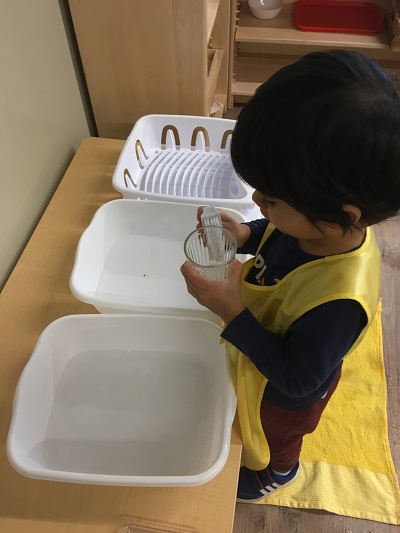For those people that have toured a Montessori school, you may have heard about the ‘Practical Life’ activities that the children work on throughout the day and wondered why so much time is focused on them.
During this series of 3 blog posts, we will dig much deeper into why Practical Life activities are so important, what they look like, and how they set the foundation for a child’s future learning. In this blog post, we will focus on the purpose of Practical Life activities in a child’s day and to their overall lives.
What Are Practical Life Activities?
Like their name implies, Practical life activities are functional everyday activities prepared for a child’s specific stage in development and broken down into a series of steps. These are activities such as folding clothes, mopping the floor, and slicing an apple.

It may seem like the purpose of these activities is to acquire these specific skills of folding, mopping, and slicing. But this only scratches the surface. The true purpose of Practical Life activities digs much deeper than acquiring a simple skill. The act of completing these works aids the young child in the construction of his entire personality in the following ways:
1) Independence
Through repetition of tasks that are relevant and engaging to the young child, he experiences the joy of his competence and becomes more confident in his ability. This leads to acting with greater independence within the classroom community and at home.
2) Concentration
A child’s mind is actively engaged when working on real activities that serve a purpose and have a positive impact on her environment. When the mind and body work in unison, the child enters into a state of deep concentration. Practical life activities allow for a very young child to concentrate and through repetition, this skill grows over time. This is a skill that begins at a very young age and grows over time.
3) Control of Movement
The activities are carefully chosen so that the child is challenged with just the right amount of difficulty. Through mastering intentional control of movement, the child not only develops fine and gross motor skills, but he begins his first steps towards building his overall self-discipline through the ability to control the movement of his body.
The fact that a child can gain this much out of simple ‘practical’ activities may seem too good to be true for some. In our next blog post, we will break down the subtleties in how these activities are designed and presented by Montessori Guides so that you see that it’s in this careful preparation where the magic often occurs.
